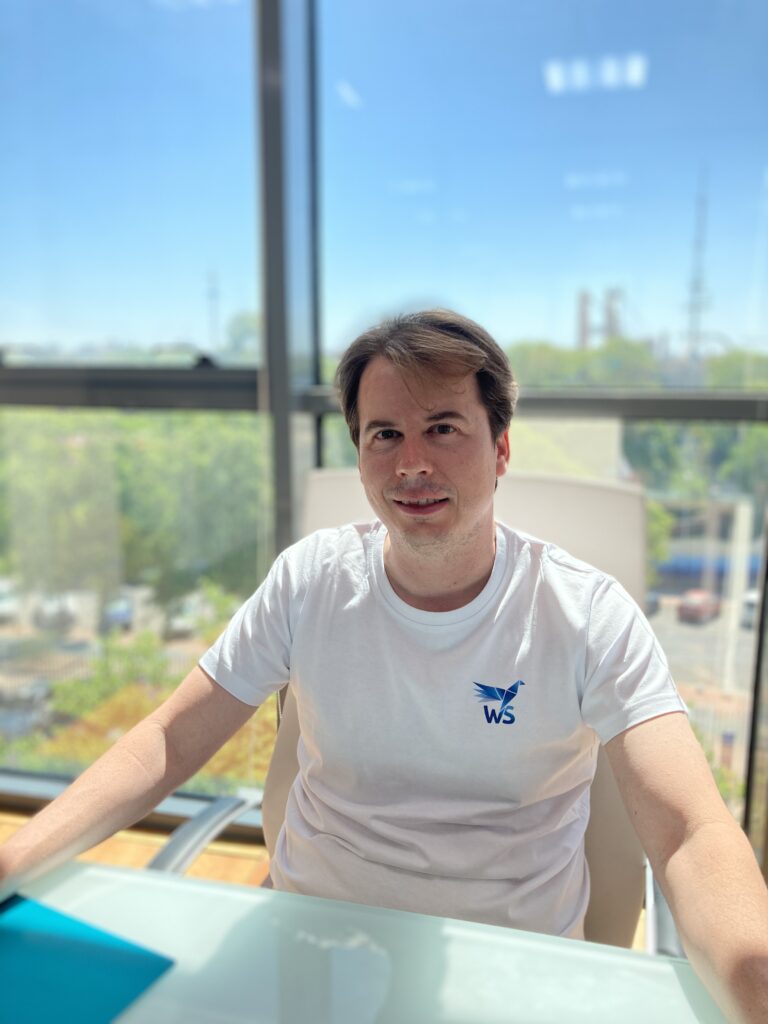
Manuel Álvarez (Woodswallow): “Not prioritizing sustainability is ethically and business irresponsible”
“Sevillian emigrated to London for work” sounds like job insecurity. As those whose year after year finish their studies and go to Great Britain to wash dishes while waiting for one opportunity. A situation that collides head-on with the goals of the 2030 Agenda in terms of workers’ rights. Fortunately, Sevillians like Manuel Álvarez, Telecommunications Engineer from the University of Seville and founder of the company Woodswallow, give a new connotation to the profile. From London, where he tells us he left for work and personal reasons, he founded in 2017 in the Andalusian capital this company dedicated to intelligent and efficient energy management. A story of entrepreneurship and commitment to sustainability that he tells us from his workplace in London.
An interview by Rey Romero.
I think that the best thing for those who do not know your company would be for you to explain to us what Woodswallow is.
Woodswallow is a technology company with a global vision that was born to improve people’s lives through the design of Internet of Things products, being specialists in products for intelligent and efficient energy management, as well as in electromobility. Our headquarters are in Seville, specifically in the Cartuja Scientific and Technological Park, and we help companies that want to bring this type of product to the market. We provide support throughout the entire development cycle: from planning the business case to defining the characteristics of the product, its development, testing, certification, support, and maintenance.
You’re answering us from your workplace in London, but the company, as far as I know, is from Seville. What is Woodswallow doing there?
Yes. Although the company is located in Seville, I’ve lived in the United Kingdom for several years for personal reasons, but also for professional reasons. I am from Seville, graduated in Telecommunications Engineering from the University of Seville, but this was the market where we started to offer our services and where most of our clients are. Thus, the fact that I am in the United Kingdom allows us to be closer to the client and have a better understanding of both their needs and the sector and new trends. This closeness and adaptation is precisely one of the things that the companies we work with most value and appreciate.
Let’s talk about one of the main topics that bring us here. On April 16, the Entrepreneur’s Day is celebrated. I guess it’s time to congratulate you and for you to tell us how Woodswallow was founded.
Thank you. I always had an interest in entrepreneurship. It is true that it is not an easy path. It is full of obstacles, and you have to take risks. But for me it is a great satisfaction to see how we can create technological employment in Seville year after year. I believe that we must encourage young people who have this interest, encourage them to do so. Unfortunately, there is little entrepreneurial culture in Andalusia, although in recent years it seems that we are seeing many initiatives and an increasingly rich ecosystem of technology startups. It is a first step. What I hope is that both the public and private spheres support small Andalusian companies so that they continue to grow.
«In Andalusia, in recent years, it seems that we are seeing many initiatives and an increasingly rich ecosystem of technology startups. It is a first step. »
In our case, Woodswallow was born when we identified a need for a specific talent gap in a field where the founding team had extensive experience. Back in 2015, the – unfortunately now defunct – UK Department of Energy and Climate Change launched a nationwide program to roll out 50 million smart meters and 30 million communication devices that required developing products with features techniques defined by the same government and that, therefore, were not yet commercially available. This led many companies to want to attack the market, creating a fight for local talent capable of developing this type of technology.
At that time, I was working for one of these technology companies that had already been awarded several tenders in the field of the program. In 2017, seeing that the fight for talent continued and that I knew a group of engineers with extensive experience in the sector, we decided to offer our development services from Seville to the United Kingdom. We started with a small team of six people and a close collaboration with the University of Seville. Little by little, our client offered us more and more projects, and we progressively grew the company. Today Woodswallow has over fifty employees and we have developed products for markets around the world.
The other issue that motivates this conversation is the need for a sustainable future. I assume you are familiar with the SDGs of the 2030 Agenda. What is your company’s contribution to the commitment to sustainability? What kind of actions or policies do you carry out?
Our activity is mainly developed around the objectives of the 2030 Agenda, such as Health and Well-being, Clean Water and Sanitation, Affordable and Non-polluting Energy, Industry, Innovation and Infrastructure, Decent Work and Economic Growth, Sustainable Cities and Communities, and Action for the weather. At Woodswallow we are convinced that every company must carry out its activities always having the contribution to society as the ultimate meaning and justification. Our firm commitment is to exercise this social function through two fronts. On the one hand, to contribute to the creation of local and quality employment, and on the other by spreading the importance of efficient and responsible energy management and the technologies that make it possible.
Apart from aligning our business activity with the 2030 Agenda, we have ongoing actions to internally enact the values behind these goals. It goes without saying that equality has been in place since the founding of Woodswallow. The company carries out regular actions to reinforce the importance of the objectives, such as, for example, the recent adherence to the Smart Mobility Cartuja challenge, internal communications on daily energy saving measures, internal training on the operation of the energy market and the importance of its sustainability or simple actions such as the change in the office from coffee in capsules to coffee beans.
«At Woodswallow we are convinced that every company must carry out its activities always having the contribution to society as the ultimate meaning and justification. »
With less than eight years to go until the deadline for achieving the SDGs, there are still companies that skip parameters such as respect for the environment, equality, contracts that respect the rights of workers… And that is only in Spain. Right now, new generations of entrepreneurs are being formed who will have to decide on the ethics of their future companies. What do you advise them in terms of sustainability and what would you advise against completely?
My advice to the new generations of entrepreneurs would be double. On the one hand, that they acquire knowledge about sustainability. The task of the entrepreneur is difficult and there are many aspects that must be managed, from corporate strategy to people and economic management, business development, marketing and communication… I believe that a good entrepreneur must have varied knowledge, and the sustainability should be no exception. On the other hand, I would recommend that they keep sustainability in mind from the beginning and take it into account when defining corporate values. Although it is never too late to incorporate them, everything that is done from the beginning will be more ingrained in the culture of the company.
Regarding what I would advise against them completely: to think that sustainability is not a priority or that it does not add value to the company and leave it aside or for later. I don’t think that’s correct. Many studies show the greatest success of companies where sustainability is deeply embedded in their corporate culture. I believe that not prioritizing sustainability is not only irresponsible from an ethical point of view, but also from the point of view of business results.
Many of the people interviewed agree that “the future will be sustainable, or it won’t be”. Has it gone from being a question of conscience to being a business question? Do you think that companies that do not include actions related to the SDGs in their CSR will be marginalized from the market?
To deny that “the future will be sustainable, or it won’t be” would be to deny the basic philosophical principle of non-contradiction: tomorrow it will rain or it won’t. There is no other possibility. The future of human society will be sustainable, or we will disappear. There is no alternative. Unfortunately, I think there are still too many selfish and short-sighted companies and people. As long as they can profit economically from unsustainable products and services, they will. It seems that the human being does not learn until the problem explodes. We just have to look at the situation we are in with Russia right now. Still, I am positive. As I said before, there are many studies that show the greatest success of companies with sustainability embedded within their corporate culture. Whether due to ethical values or the search for return on investment, I believe that the proportion of companies that integrate sustainable objectives within their CSR will grow rapidly in the coming years as a result of the energy and geopolitical crises that we are facing.
«To deny that the future will be sustainable or will not be would be to deny the basic philosophical principle of non-contradiction: tomorrow it will rain or it will not rain. There is no other possibility. The future of human society will be sustainable, or we will disappear. There is no alternative»
The economy decides the future and at least 90 percent of the economy are the companies of the planet. As things are being done today, how do you imagine the world in, say, a quarter of a century?
Observing both technological and socioeconomic trends, I believe that we will experience an increase in companies in the services sector. The rise of consumerism will lead to it. Increased automation and corporate mergers will lead to a shorter working day. I believe that the four-day workday will be the norm in a quarter of a century.
Regarding sustainable goals, I am very positive about the evolution of the energy market. I believe the future will be mostly powered by renewable energies thanks to the improvement in the generation technologies of these, as well as distributed storage. The use of unsustainable energy sources will be reduced to backup situations. I believe in a step backwards with respect to the hyper globalized model that we have today. The supply of cross-border products and services will prosper when it makes sense not only economically, but also sustainable and resilient.
I think we will see a boom in product and service companies at a more localized level. But I am less optimistic about the decline in inequality, whether at the national level or between the developed and developing world. I believe that we could achieve more progress there, not in twenty-five, but in fifty years, if we give a greater push to the most important SDG from my point of view: quality education.
I’ve left the most difficult question for last. Complete the sentence: “A good entrepreneur…”
That’s not the hardest, it’s the easiest! A good entrepreneur, only a good team is missing.
Read the full interview on Andalusia 2030 here: Manuel Álvarez (Woodswallow): «No priorizar la sostenibilidad es poco responsable ética y empresarialmente» – Andalucía 2030Andalucía 2030 (andalucia2030.org)






